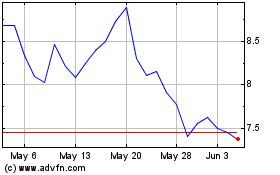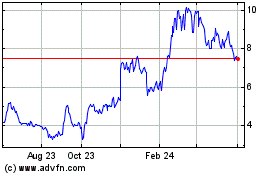Joint effort to leverage existing collaboration
and non-dilutive grants to advance development of proprietary Treg
exosome technology towards a first-in-human clinical study,
continue work on validating biomarkers in a variety of
neurodegenerative diseases, and explore novel synergistic drug
combinations with COYA 301 (proprietary Low Dose Interleukin-2, or
LD IL-2)
Coya Therapeutics, Inc. (NASDAQ: COYA) (“Coya” or the
“Company”), a clinical-stage biotechnology company developing
biologics intended to enhance regulatory T cell (Treg) function,
announces the expansion of its research collaboration with the
Houston Methodist Research Institute (“HMRI”) through a sponsored
research agreement (SRA) covering multiple initiatives.
The development and production of exosomes from patients’
regulatory T cells will be funded by the Johnson Center for
Cellular Therapeutics with participation of the SRA from Coya to
Dr. Stanley Appel, Director of the Johnson Center and Chair of
Coya’s Scientific Advisory Board.
Coya and HMRI will advance the development of multiple patented
modalities of exosomes, including full characterization of the
nanovesicles, and GMP manufacturing to enable a first-in-human
academic clinical study. Furthermore, Coya will continue the
characterization and validation of several clinical biomarkers in
patients with Amyotrophic Lateral Sclerosis, Alzheimer’s Disease,
Frontotemporal Dementia, and Parkinson’s Disease. These proprietary
biomarkers will provide valuable tools to better objectively
correlate disease status and biological processes, improve the
criteria for participation and stratification in clinical studies,
and assess treatment response. In addition, Coya and HMRI will
continue exploring the potential synergy of COYA 301 (LD IL-2) with
other relevant drug products, following the innovative approach of
COYA 302 (LD IL-2 + CTLA4-Ig) targeting multiple paths involved in
the pathophysiology of severe neurodegenerative and autoimmune
diseases. Biologic combinations serve as the cornerstone of Coya’s
unique approach in addressing the complex pathophysiology of
diseases and offer future opportunities for strategic
collaborations.
About COYA 301 COYA 301 is the company’s proprietary
investigational low-dose interleukin-2 (IL-2) intended to enhance
the anti-inflammatory function of regulatory T Cells and is
designed for subcutaneous administration.
About COYA 302 COYA 302 is an investigational and
proprietary biologic combination therapy with a dual
immunomodulatory mechanism of action intended to enhance the
anti-inflammatory function of regulatory T cells (Tregs) and
suppress the inflammation produced by activated monocytes and
macrophages. COYA 302 is comprised of proprietary low dose
interleukin-2 (LD IL-2) and CTLA-4 Ig and is being developed for
subcutaneous administration for the treatment of patients with ALS,
FTD, and PD. These mechanisms may have additive or synergistic
effects.
In February of 2023, Coya announced results from a
proof-of-concept, open-label clinical study evaluating commercially
available LD IL-2 and CTLA-4 Ig in a small cohort of patients with
ALS conducted at the Houston Methodist Research Institute (Houston,
Texas) by Stanley Appel, M.D., Jason Thonhoff, M.D., Ph.D., and
David Beers, Ph.D. This study was the first-of-its-kind evaluating
this dual-mechanism immunotherapy for the treatment of ALS.
Patients in the study received investigational treatment for 48
consecutive weeks and were evaluated for safety and tolerability,
Treg function, serum biomarkers of oxidative stress and
inflammation, and clinical functioning as measured by the ALSFRS-R
scale.
During the 48-week treatment period, the therapy was well
tolerated. The most common adverse event was mild injection-site
reactions. No patient discontinued the study, and no deaths or
other serious adverse events were reported.
Patients' disease progression was measured using the ALSFRS-R
scale, a validated rating tool for monitoring the progression of
disability in patients with ALS. The mean (±SD) ALSFRS-R scores at
week 24 (33.75 ±3.3) and week 48 (32 ±7.8) after initiation of
treatment were not statistically different compared to the ALSFRS-R
score at baseline (33.5 ±5.9), suggesting significant amelioration
in the progression of the disease over the 48-week treatment
period.
Treg suppressive function, expressed as percentage of inhibition
of proinflammatory T cell proliferation, showed a statistically
significant increase over the course of the treatment period and
was significantly reduced at the end of the 8-week washout
post-treatment period. Treg suppressive function at 24 weeks (79.9
±9.6) and 48 weeks (89.5 ±4.1) were significantly higher compared
to baseline (62.1 ±8.1) (p<0.01), suggesting enhanced and
durable Treg suppressive function over the course of treatment. In
contrast, Treg suppressive function (mean ±SD) was significantly
decreased at the end of the 8-week washout period compared to
end-of-treatment at week 48 (70.3 ±8.1 vs. 89.5 ±4.1, p
<0.05).
The study also evaluated serum biomarkers of inflammation,
oxidative stress, and lipid peroxides. The available data up to 16
weeks after initiation of treatment suggest a decrease in these
biomarker levels, which is consistent with the observed enhancement
of Treg function. The evaluation of the full biomarker data is
ongoing.
COYA 302 is an investigational product not yet approved by the
FDA or any other regulatory agency.
About Coya Therapeutics, Inc. Headquartered in Houston,
TX, Coya Therapeutics, Inc. (Nasdaq: COYA) is a clinical-stage
biotechnology company developing proprietary treatments focused on
the biology and potential therapeutic advantages of regulatory T
cells (“Tregs”) to target systemic inflammation and
neuroinflammation. Dysfunctional Tregs underlie numerous
conditions, including neurodegenerative, metabolic, and autoimmune
diseases, and this cellular dysfunction may lead to sustained
inflammation and oxidative stress resulting in lack of homeostasis
of the immune system.
Coya’s investigational product candidate pipeline leverages
multiple therapeutic modalities aimed at restoring the
anti-inflammatory and immunomodulatory functions of Tregs. Coya’s
therapeutic platforms include Treg-enhancing biologics,
Treg-derived exosomes, and autologous Treg cell therapy.
COYA 302 – the Company’s lead biologic investigational product
or “Pipeline in a Product”– is a proprietary combination of COYA
301 (Coya’s proprietary LD IL-2) and CTLA4-Ig for subcutaneous
administration with a unique dual mechanism of action that is now
being developed for the treatment of Amyotrophic Lateral Sclerosis,
Frontotemporal Dementia, Parkinson’s Disease, and Alzheimer’s
Disease. Its multi-targeted approach enhances the number and
anti-inflammatory function of Tregs and simultaneously lowers the
expression of activated microglia and the secretion of
pro-inflammatory mediators. This synergistic mechanism may lead to
the re-establishment of immune balance and amelioration of
inflammation in a sustained and durable manner that may not be
achieved by either low-dose IL-2 or CTLA4-Ig alone.
For more information about Coya, please visit
www.coyatherapeutics.com
Forward-Looking Statements This press release contains
“forward-looking” statements that are based on our management’s
beliefs and assumptions and on information currently available to
management. Forward-looking statements include all statements other
than statements of historical fact contained in this presentation,
including information concerning our current and future financial
performance, business plans and objectives, current and future
clinical and preclinical development activities, timing and success
of our ongoing and planned clinical trials and related data, the
timing of announcements, updates and results of our clinical trials
and related data, our ability to obtain and maintain regulatory
approval, the potential therapeutic benefits and economic value of
our product candidates, competitive position, industry environment
and potential market opportunities. The words “believe,” “may,”
“will,” “estimate,” “continue,” “anticipate,” “intend,” “expect,”
and similar expressions are intended to identify forward-looking
statements.
Forward-looking statements are subject to known and unknown
risks, uncertainties, assumptions and other factors including, but
not limited to, those related to risks associated with the impact
of COVID-19; the success, cost and timing of our product candidate
development activities and ongoing and planned clinical trials; our
plans to develop and commercialize targeted therapeutics; the
progress of patient enrollment and dosing in our preclinical or
clinical trials; the ability of our product candidates to achieve
applicable endpoints in the clinical trials; the safety profile of
our product candidates; the potential for data from our clinical
trials to support a marketing application, as well as the timing of
these events; our ability to obtain funding for our operations;
development and commercialization of our product candidates; the
timing of and our ability to obtain and maintain regulatory
approvals; the rate and degree of market acceptance and clinical
utility of our product candidates; the size and growth potential of
the markets for our product candidates, and our ability to serve
those markets; our commercialization, marketing and manufacturing
capabilities and strategy; future agreements with third parties in
connection with the commercialization of our product candidates;
our expectations regarding our ability to obtain and maintain
intellectual property protection; our dependence on third party
manufacturers; the success of competing therapies or products that
are or may become available; our ability to attract and retain key
scientific or management personnel; our ability to identify
additional product candidates with significant commercial potential
consistent with our commercial objectives; ; and our estimates
regarding expenses, future revenue, capital requirements and needs
for additional financing.
We have based these forward-looking statements largely on our
current expectations and projections about future events and trends
that we believe may affect our financial condition, results of
operations, business strategy, short-term and long-term business
operations and objectives, and financial needs. Moreover, we
operate in a very competitive and rapidly changing environment, and
new risks may emerge from time to time. It is not possible for our
management to predict all risks, nor can we assess the impact of
all factors on our business or the extent to which any factor, or
combination of factors, may cause actual results to differ
materially from those contained in any forward-looking statements
we may make. In light of these risks, uncertainties and
assumptions, the forward-looking events and circumstances discussed
herein may not occur and actual results could differ materially and
adversely from those anticipated or implied in the forward-looking
statements. Although our management believes that the expectations
reflected in our forward-looking statements are reasonable, we
cannot guarantee that the future results, levels of activity,
performance or events and circumstances described in the
forward-looking statements will be achieved or occur. We undertake
no obligation to publicly update any forward-looking statements,
whether written or oral, that may be made from time to time,
whether as a result of new information, future developments or
otherwise.
View source
version on businesswire.com: https://www.businesswire.com/news/home/20240620465914/en/
Investor Contact David
Snyder, CFO david@coyatherapeutics.com CORE IR Bret Shapiro
brets@coreir.com 561-479-8566 Media
Contacts Kati Waldenburg media@coyatherapeutics.com
212-655-0924
Coya Therapeutics (NASDAQ:COYA)
Historical Stock Chart
From May 2024 to Jun 2024

Coya Therapeutics (NASDAQ:COYA)
Historical Stock Chart
From Jun 2023 to Jun 2024
